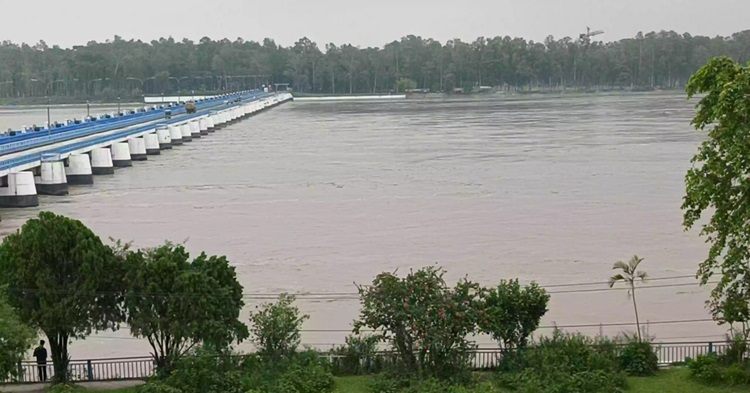The Teesta Barrage, the largest irrigation project in Bangladesh, has allegedly become a center of mismanagement, corruption, extortion, and land grabbing, putting the lives and livelihood in the northern region under risk.
Located at the Lalmonirhat-Nilphamari junction, the barrage was constructed in 1988 with 52 gates to protect five northern districts—Rangpur, Lalmonirhat, Kurigram, Gaibandha, and Nilphamari—from Indian water aggression and to ensure irrigation.
Officials tasked with protecting state resource are allegedly involved in these illegal activities under political protection.
Experts said unless action is taken immediately, the barrage may fail to fulfill its core purpose—ensuring irrigation and saving farmers’ livelihoods in drought-prone areas.
Political party leaders of successive governments have collected tolls illegally from the vehicles over the years and the situation has not changed after political changeover, alleged locals.
According to engineering design, the barrage can handle a maximum load of 20 tons but 300–350 trucks carrying 30–40 tons pass through daily.
An official involved in the barrage’s maintenance, speaking on condition of anonymity, said, “Around Tk 15 lakh is extorted daily. We cannot intervene as our jobs would be at risk.”
The official said the reckless toll collection threatens the barrage’s structural integrity, with cracks appearing in several points.
An Ansar member said, “They collect a big amount of toll from each truck. We only do our duty; the real share goes up the chain.”
In 2014, heavy vehicles passing through gates 24, 27, and 28 of the barrage was prohibited after cracks appeared.
Although toll collection was officially halted on paper a new chapter of extortion began.
Several people preferring anonymity said after political changeover in August last year, leaders of different political parties from Hatibandha, Patgram, and Dimla formed alliances to continue extortion.
DIG Aminul Islam of the Rangpur police range said, “Since 2024 July uprising we have not received credible reports of extortion at the barrage. Appropriate measures will be taken if we get information.”
Ahsan Habib, Superintending Engineer of the Rangpur region under WDB, said, “We are trying to prevent any misuse of the barrage.”
Besides, irrigation canals have allegedly been occupied by influential people.
Although mineral extraction is prohibited within a one-kilometer radius of the barrage sand is being extracted from the barrage site, altering river paths and endangering the structure.
A Water Development Board official said repeated written complaints were ignored due to the syndicate’s influence.
Police and RAB records show over 1,200 bottles of Phensedyl and thousands of Yaba pills were recovered from the barrage area last year.
Local residents question how drugs can bypass CCTV, Ansar battalions, and police patrols.
Two weighing scales built at a cost of Tk 1.5 crore remain nonfunctional for years as political influence and corrupt officials allegedly delayed repairs intentionally.
Locals said if the barrage was properly managed it could support farmers and attract tourists but it has now become a stronghold of corruption.
Monirul Islam, Executive Engineer of the Mechanical Division at Dalia WDB, said, “Vehicles should not exceed 20 tons. Requests for scale repair have been submitted.”
Amitabh Chowdhury, Executive Engineer of the Power Division at Dalia WDB, said, “Heavy vehicles are not allowed. We are working on 35 packages for canal renovation and 10 have been completed. We will take step for land acquisition once we get the budget. We are helpless in stopping extortion.”
Dr. Tuhin Wadud, Chairman of river research institute Riverain People, said, “Improper Teesta flow causes nearly Tk 1 lakh crore in annual flood damages. Mismanagement of the barrage endangers the entire region including Nilphamari, Lalmonirhat, and Kurigram. Authorities must act now and the extortion around the barrage must be stopped immediately.”


